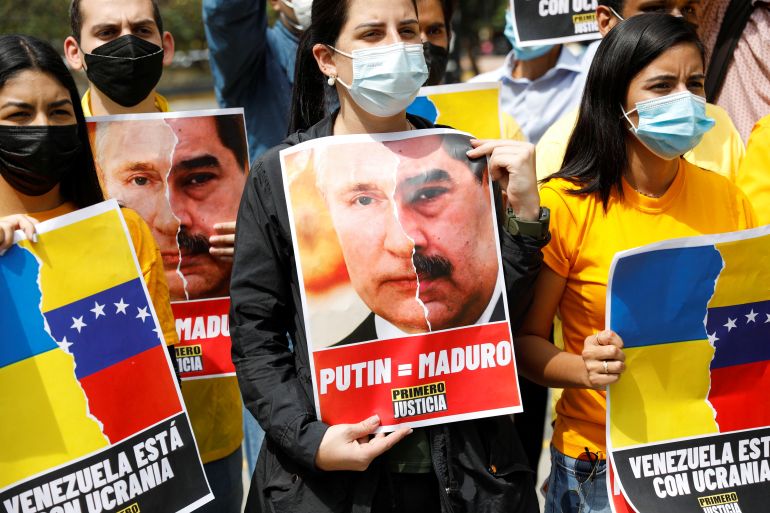Venezuela frees two jailed US citizens after talks
Move comes as Venezuela signals interest in improving relations with the US amid Russia’s invasion of Ukraine.

Venezuela has freed two jailed United States citizens in an apparent goodwill gesture following a visit to Caracas by a high-level delegation from Washington, DC.
One of the prisoners freed on Tuesday was Gustavo Cardenas, among six Citgo oil executives arrested in 2017 and convicted on charges of corruption that the US government said were fabricated.
Keep reading
list of 4 itemsUS rejects Poland’s offer to send MiG-29 fighter jets to Ukraine
What India’s position on Russia-Ukraine war means for its EU ties
US bans Russian oil: What is next for oil and gas prices?
The other was a Cuban American, identified as Jorge Alberto Fernandez, detained on unrelated charges.
“Tonight, two Americans who were wrongfully detained in Venezuela will be able to hug their families once more,” US President Joe Biden said in a statement.
“We are bringing Gustavo Cardenas and Jorge Fernandez home,” he said. He gave no more details about their release.
We welcome the long overdue release and return of Gustavo Cardenas and Jorge Alberto Fernandez, detained in Venezuela. We have more work to do.
— Secretary Antony Blinken (@SecBlinken) March 9, 2022
The US Department of State confirmed the arrival of Cardenas and Fernandez in the US on Wednesday.
“We welcome the release of US citizens Gustavo Cardenas and Jorge Alberto, both of whom had been unjustly detained in Venezuela,” Secretary of State Antony Blinken said in a statement.
“They have recently arrived back in the United States, accompanied by Roger Carstens, our Special Presidential Envoy for Hostage Affairs.”
Their release came hours after Venezuelan President Nicolas Maduro signalled an interest in improving relations at a time when Russia’s invasion of Ukraine has sparked concerns in the US over rising petrol prices.
In a televised address, he appeared to indicate he was willing to accede to US demands that he resume negotiations with his opponents as a first building block for any relief from US sanctions that have been punishing the OPEC nation for years.
US officials have not detailed any other specific outcomes of the talks, but said the release reflected months of relationship building, particularly involving Carstens, the US administration’s hostage-affairs envoy.
Carstens made a trip to Venezuela in December that did not immediately result in the release of detainees but that senior administration officials credited with establishing trust and laying the groundwork for Tuesday’s outcome.
He returned to Venezuela last weekend with other administration officials, with talks focusing not only on the fate of detained Americans but on the possibility of easing US oil sanctions on Venezuela to fill a supply gap if Biden bans Russian oil imports in response to Moscow’s invasion of Ukraine – something he did on Tuesday.
Venezuela is Russia’s closest ally in South America.
Russia’s invasion
The talks came together after months of backchannel efforts by intermediaries – US lobbyists, Norwegian diplomats and international oil executives – who have been pushing for Biden to revisit the so-far-unsuccessful “maximum pressure” campaign to unseat Maduro that he inherited from his successor.
But the impetus for the outreach to Maduro, who has been sanctioned and is indicted in New York on drug trafficking charges, took on added urgency following Russia’s invasion of Ukraine and ensuing US sanctions.
The Ukraine crisis promises to reshuffle global alliances and add to rising petrol prices driving US inflation already at a four-decade high.
Biden ramped up the pressure campaign on Moscow on Tuesday with his announcement of a US ban on Russian oil and other energy imports. The ban could further increase prices at the pump for American consumers, adding to inflationary pressure.
Engagement with Maduro, a longtime US foe, was also aimed at gauging whether Venezuela is prepared to distance itself from Russia.
But the Biden administration faced strong criticism on Capitol Hill for its contact with Maduro, who is under US sanctions for human rights abuses and political repression.
Senator Robert Menendez, a Democrat and chairman of the Senate Committee on Foreign Relations, urged the White House not to pursue a deal with Venezuela.
Maduro, he said in a statement, “is a cancer to our hemisphere and we should not breathe new life into his reign of torture and murder”.
Foro Penal, a Venezuelan rights group, also criticised the terms of Cardenas’s release.
Gonzalo Himiob, a lawyer and vice president-director of Foro Penal, said in a statement that the end of an arbitrary detention should be celebrated but warned of the consequences that can come from an agreement like the one that led to Cardenas’s release.
“The release of any political prisoner, when it arises from an agreement between political actors, and not from respect for the law, confirms that from the beginning the reasons for the detention were neither legal nor valid, but political and, consequently, arbitrary and contrary to human rights,” Himiob said.